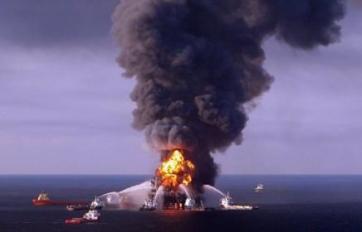 A US presidential panel probing the Gulf of Mexico oil disaster examined Tuesday the oil industry’s safety culture, after its lead investigator said he found no evidence BP and its partners had sacrificed safety for profits.
A US presidential panel probing the Gulf of Mexico oil disaster examined Tuesday the oil industry’s safety culture, after its lead investigator said he found no evidence BP and its partners had sacrificed safety for profits.
“To date, we have not seen a single instance where a human being made a conscious decision to favor dollars over safety,” Fred Bartlit, chief counsel to the commission, said Monday at the start of the two-day hearing.
The April 20 explosion on the BP-leased Deepwater Horizon rig killed 11 workers and sparked a massive oil spill that crippled local fishing and tourism industries and did untold damage to the Gulf’s fragile ecosystem.
Bartlit also said the probe team agreed with 90 percent of the findings of BP’s 183-page in-house report released in September, but slapped the oil giant for taking “unnecessary risks” that may have led to the platform explosion.
BP had repeatedly changed its plan for securing the well after drilling was completed, and also took the unusual step of placing a cement plug to seal the well 3,000 feet (900 meters) below the surface instead of the usual 300 feet (90 meters) down, and then filling the space above it with water instead of heavier mud, the panel found.
“That cement plug acts as a backup barrier, just in case anything happens with the cement down at the bottom,” said Bartlit.
“If hydrocarbons begin to leak in they will be stopped by that surface cement plug. We think BP introduced a certain amount of risk into the situation that we think may not have been necessary.”
Bartlit’s assessment put him at odds with US lawmakers who accused BP and its main partners on the Macondo well, Halliburton and Transocean, of cutting corners to finish drilling the well, which was reportedly millions of dollars over-budget and costing 1.5 million dollars a day.
Representative Edward Markey, who chairs a committee that is probing the oil spill, said the disaster was just the latest example of BP’s “long and sordid history of cutting costs and pushing the limits in search of higher profits.”
Commission co-chair Senator Bob Graham suggested all three companies involved made mistakes because of pressure to complete work on the well by April 20.
“As a result of that, a number of things that might have made the outcome quite different were deferred or abandoned,” he said.
The other panel co-chair, William Reilly, said the accident had been caused by a “culture of complacency affecting everything involved with this exercise.
“If we had not been complacent, we would not have experienced two full months of a gushing well leading to 200 million gallons being spilled,” he said.
Bartlit said the initial assessment of the team that conducted the probe, which was ordered by President Barack Obama weeks after the spill started, was that the explosion on the rig was caused by flammable hydrocarbons rushing up the casing of a riser pipe to the platform and exploding.
BP and Transocean workers on the rig failed to recognize warning signs on a computer which was showing a dangerous build-up of hydrocarbons in the riser pipe just before the blast on the rig, the probe found.
Rig workers also misinterpreted the results of a specialized pressure test to see if the cement had isolated the hydrocarbons, said Sean Grimsley, deputy chief counsel for the commission, calling the experienced workers’ misjudgment one of the biggest mysteries surrounding the accident.
“The question is why these experienced men out on that rig talked themselves into believing that this was a good test that had established well integrity,” he said.
“None of the men out on the rig wanted to die. None of the men out there on the rig wanted to jeopardize their safety. Why did they come to this conclusion? We may never know the answer to that question.”
Many of the workers on the rig died in the blast and some officials from all three companies have refused to testify before the commission, which the US Senate has refused to grant the power to subpoena witnesses.
The seven-member commission has to present Obama with a report on the root causes of the Gulf oil disaster by January 11.

